Justice and Peace
Launch of Y+: A first ever collaboration between Singapore’s 3Ys to serve persons with disabilities
Launch of Y+: A first ever collaboration between Singapore’s 3Ys to serve persons with disabilities.
Metropolitan YMCA Singapore, YMCA of Singapore, YWCA of Singapore recently announced the launch of Y+ - a pioneering collaborative community engagement initiative to serve persons with disabilities and their caregivers. This collaboration saw the 3 Ys coming together for the first time and partnering SG Enable, a government agency that focuses on disability and inclusion in Singapore, enabling persons with disabilities to live, learn, work and play in an inclusive society. The ultimate goal was to have support from a government agency that specifically impacts persons with disabilities and helping them secure employment opportunities for their futures.
The Y+ collaboration aims to roll out innovative community solutions as part of a collaborative framework to better support persons with disabilities and their caregivers. This is especially critical after they turn 18 years old and opportunities shrink during the critical transition from Special Education schools to employment and community integration. This is known as the post-18 cliff effect. Y+ aims to plug the gap for persons with disabilities and additional needs to ensure they continue to lead fruitful and meaningful lives. Initiatives such as Y Crops @ Metropolitan YMCA, Y Dance @ YMCA of Singapore and Y Wellness Weave @ YWCA are the three pilot programmes that will be rolled out under the Y+ initiative to meaningfully engage persons with disabilities through urban farming, dance and craft-making. The end goal is to foster a sense of community, inclusion, and therapeutic interactions to promote mental wellness.
In attendance were YWCA’s Executive Director, Ms Ong Puay See, General Secretary, YMCA of Singapore’s CEO Ms Wu Mei Ling, and Metropolitan YMCA Group CEO Ms Grace Chan, along with the Mayor of Central Singapore District Ms Denise Phua. The event also saw MYMCA staff, Mr Isaac Komatt, a person with disabilities under MYMCA’s Place and Train programme, leading the session on hydroponics farming, and conducting a brief teaching session with guests and beneficiaries.

L-R: Ms Wu Mei Ling, Ms Denise Phua, Ms Grace Chan, Ms Ong Puay See (Photo: MYMCA)
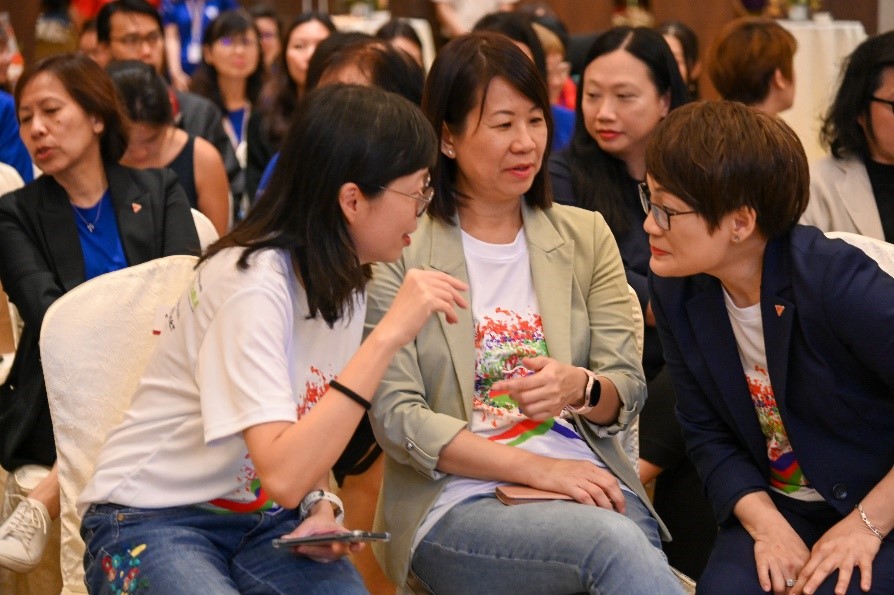
3 CEOs of the Ys interacting during the Y+ event. (Photo: MYMCA)
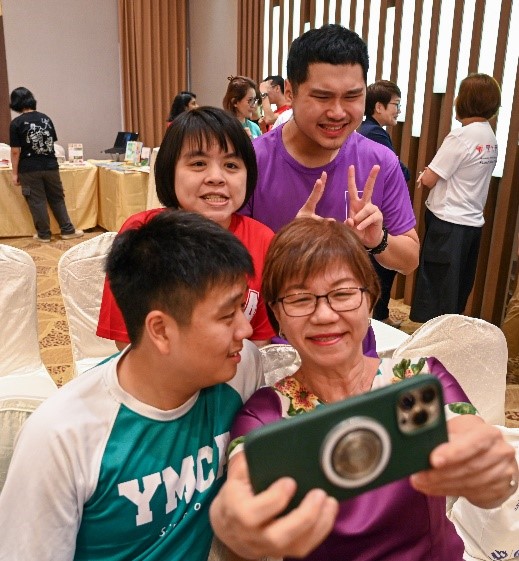
Mayor Ms Denise Phua interacted with some of the persons with disabilities. (Photo: MYMCA)
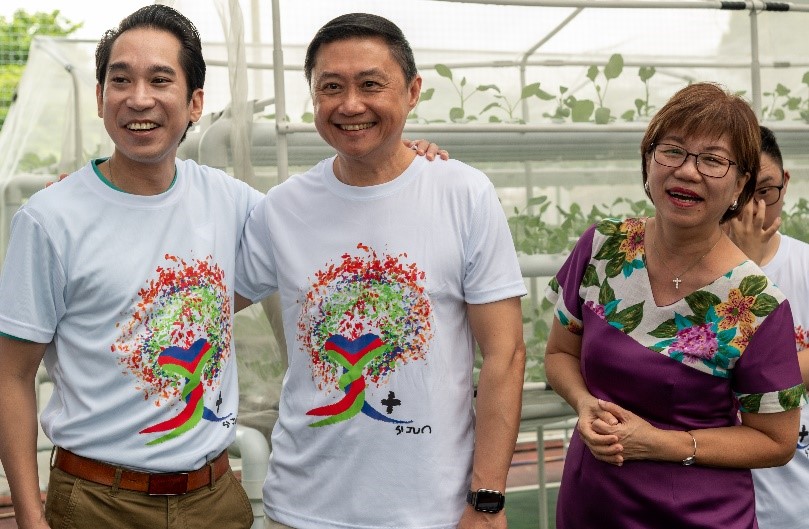
MYMCA President Mr Charis Lim, YMCA of Singapore President Mr Tony Soh and Mayor Denise Phua at MYMCA’s Hydroponics Urban Farm posing for a photo during the Symbolic Act of Partnership. (Photo: MYMCA)
For more information, please visit our website at
Hiroshima YMCA International Youth Peace Seminar
Last Updated (Friday, 09 August 2024 12:32)

YMCA Korea and APAY participated in the 1st Korea Peace Day, organized by Border Peace School in Cheorwon, near the DMZ
Last Updated (Tuesday, 02 July 2024 15:44)
YMCA Korea and APAY participated in the 1st Korea Peace Day, organized by Border Peace School in Cheorwon, near the DMZ
On June 6th 2024, the 1st Korea Peace Day was held in Cheorwon near the Demilitarized Zone (or DMZ), where more than 800 participants from various ecumenical organizations and civil society organizations were present, yearning for reconciliation and peaceful co-existence between the two Koreas. Among them were the delegates from YMCA Korea, Korean YWCA, NCC-Korea along with many pastors of the Presbyterian Churches of the Republic of Korea (PCRK). APAY has also joined the event in support of the peace initiatives made by the Border Peace School (Principal Dr. Jung Ji-Seok).
During the event, Mr. Nidal Abu Zuluf, a peace activist from Palestine and coordinator of the Olive Tree Campaign, conducted a special session. Several local YMCAs, including Goyang YMCA led by GS Lee Yun-Hee from Korea, have been participating in this campaign. Mr. Zuluf expressed solidarity and support for the collective efforts of like-minded ecumenical communities in Korea on peace and reconciliation in the Korean peninsula. He also shared the current challenging situations faced by the Palestinian Christians and the general population due to the ongoing war in Gaza and other areas.
Towards the end of the peace event, all participants unanimously adopted a “People’s Declaration for Great Peace” and were resolved to commit themselves towards peacebuilding, reconciliation and re-unification in the long run of the Korean Peninsula.
 |  |
| Dr. Jung Ji-Seok, Principal of Border Peace School, is leading a solidarity performance with participants and Nidal Abu Zuluf. | Nidal Abu Zuluf is making his solidarity remarks at the opening ceremony. |
 |  |
| Four representatives among participants are reading the People_s Declaration on Great Peace. | Participants performing a solidarity action with Nidal Abu Zuluf on peacebuilding in the Korean Peninsula. |
By Yura Rhee
Secretary for Youth Empowerment and Admin
“People’s Declaration for Great Peace”



Myanmar YMCA Hosts 73rd Annual National Board Meeting Amid Ongoing Crisis
Myanmar YMCA Hosts 73rd Annual National Board Meeting Amid Ongoing Crisis
The National Council of YMCAs of Myanmar commemorated its 73rd anniversary with the 73rd Annual National Board Meeting, held at the National Council office in Yangon on April 2-3, 2024. The event theme, “Community Wellbeing,” aligns with the global YMCA Vision 2030 pillar.
In the wake of the evolving crisis in Myanmar, the YMCA remains steadfast in its commitment to support the people affected by ongoing conflicts. Demonstrating solidarity, the event brought together representatives from all 33 local YMCAs and affiliated YMCAs, both in-person and virtually.
 | 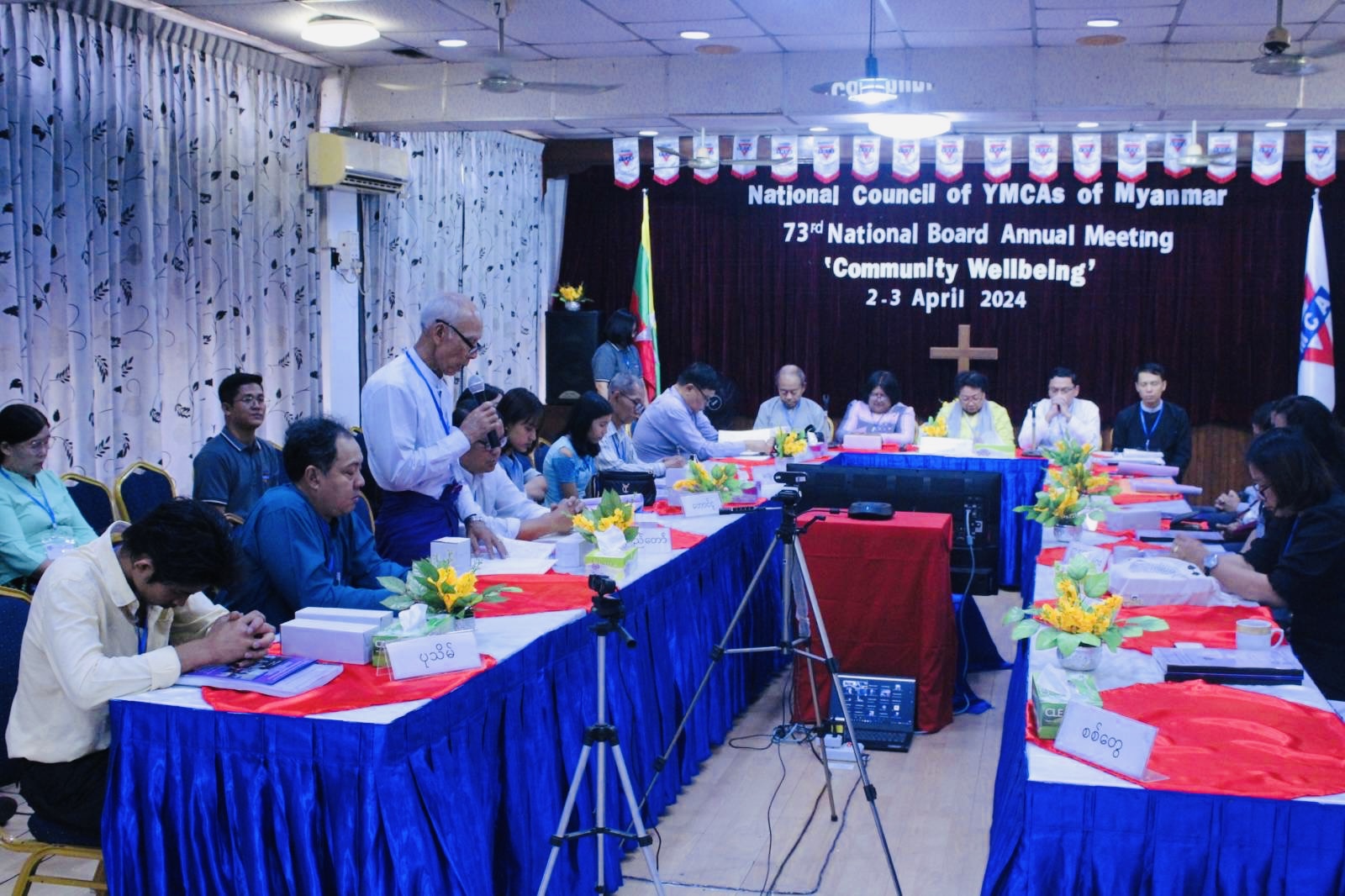 |
Key Details of the Meeting
Venue and Participation:
Location: National Council of YMCAs of Myanmar office, Yangon, Myanmar
Date: April 2-3, 2024
Attendance: Approximately 50 representatives attended physically, while around 40 participants joined via Zoom
Objectives and Outcomes
The primary focus of the meeting was to discuss the future operations and constitutional guidelines of the YMCA in Myanmar. The discussions aimed at aligning the national agenda with the global YMCA priorities. Key outcomes included a renewed strategic plan to enhance community wellbeing and a commitment to adapting the organization’s constitution to better serve its members in these challenging times.
Insights and Reflections
Participants gained valuable insights into the current state of affairs and the role of YMCA in fostering community resilience. The hybrid format, utilizing the Zoom platform, allowed for inclusive participation despite the challenging circumstances.
International Partnerships and Projects
In 2023, Myanmar YMCA partnered with several international organizations, including DCA-NCA, Danish Refugee Council, Bread for the World, International Organization for Migration (IOM), UNICEF, Impulse NGO Network India, Y's Men International, and Livelihood and Food Security Funds (LIFT). These collaborations resulted in eight ongoing community development projects nationwide, focusing on critical areas such as:
- Food Security
- Protection from Gender-based Violence
- Support for Internally Displaced Populations (Dry Rations and Agroforestry)
- Anti-Human Trafficking
- Counseling Services
- Youth Employment
- Child Protection
- Community WASH (Water, Sanitation, and Hygiene)
These projects significantly contribute to the YMCA's mission of fostering community wellbeing and addressing urgent humanitarian needs.
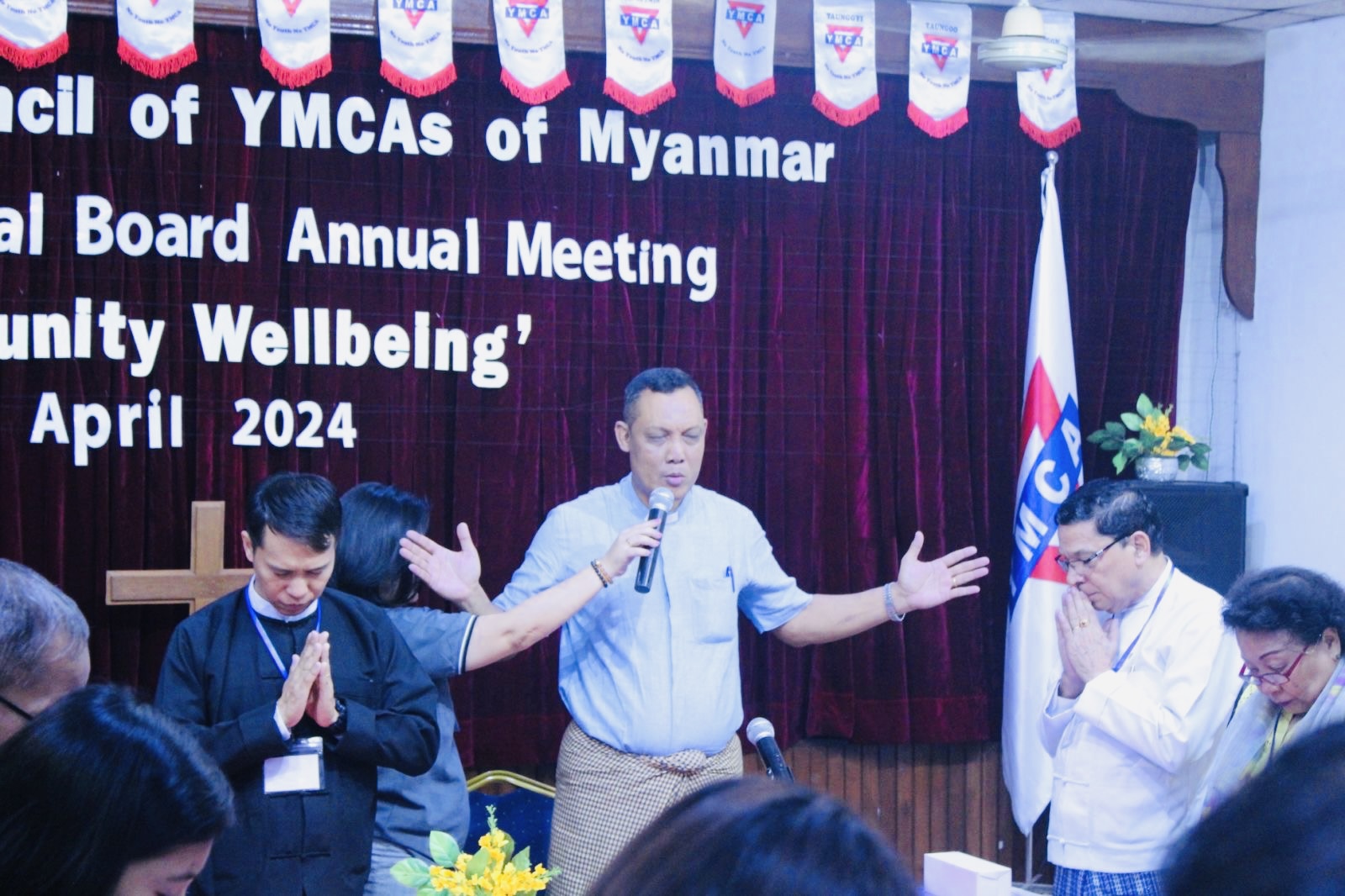 | 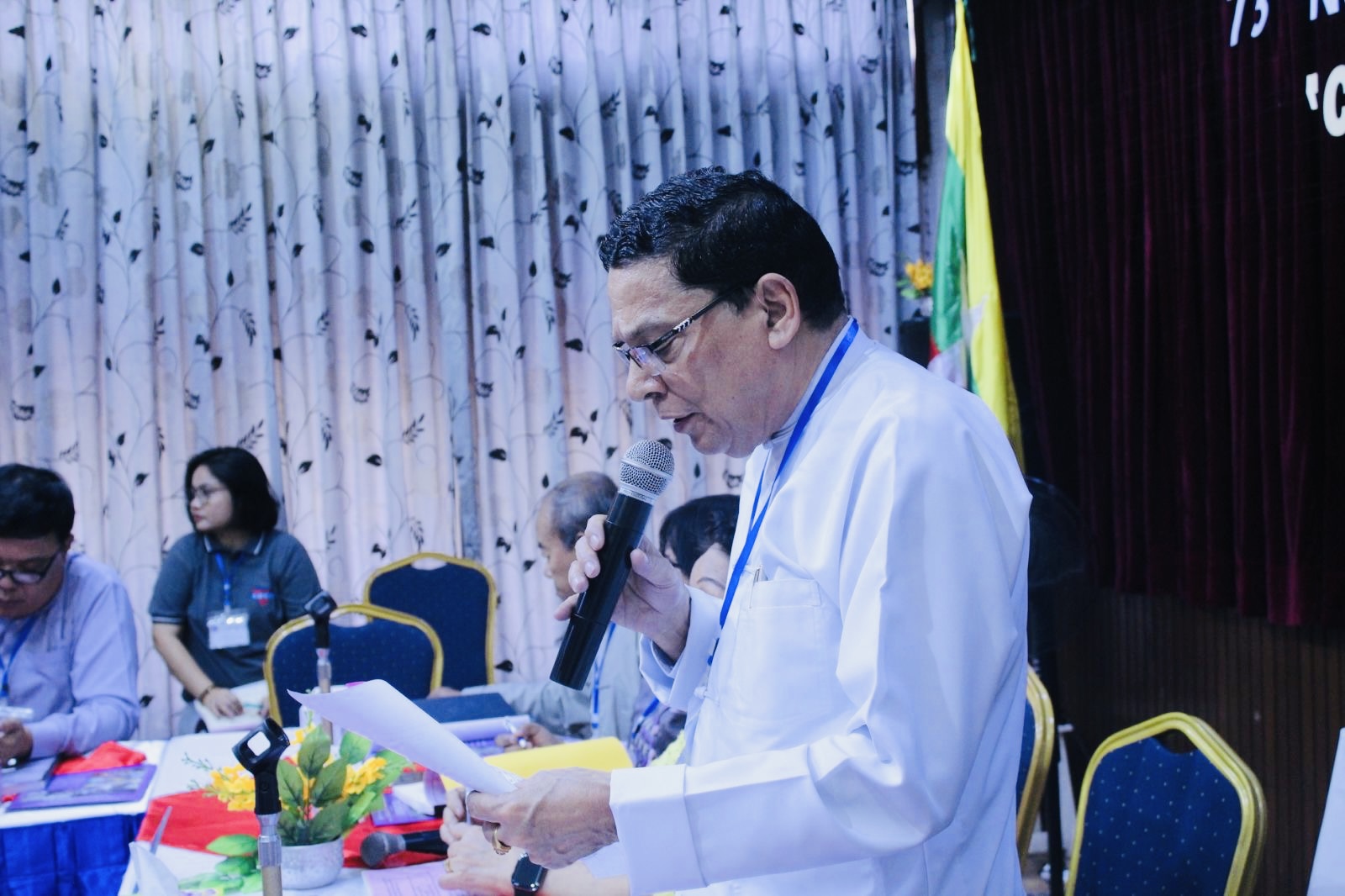 |
Quotes from Participants
Mr. Maung Maung Win, National General Secretary: “This meeting reaffirms our commitment to community wellbeing, especially during these trying times. The solidarity shown here gives us hope and direction.”
Mr. Dan Yae La, a virtual participant: “Joining this meeting online was crucial for me. It allowed us to stay connected and contribute to our shared goals despite the physical distance.”
Conclusion
The 73rd Annual National Board Meeting of the National Council of YMCAs of Myanmar was a significant milestone, reinforcing the organization’s dedication to community wellbeing amid ongoing challenges. The hybrid gathering underscored the adaptability and resilience of the YMCA community, ensuring continued support and solidarity for those affected by the crisis in Myanmar.
With robust international partnerships and impactful community development projects, Myanmar YMCA continues to make a positive difference in the lives of many. The National Council looks forward to implementing the strategies discussed and continuing to support the communities they serve.
For more information and updates on future activities, please visit www.facebook.com/myanmarymca
By -ALEX KAUNG MYAT HTOO
Country Team Lead | Humanitarian Programme Manager
Impulse NGO Network Humanitarian Relief Support Programme
National Council of YMCAs of Myanmar
Yokohama YMCA - Special Online Prayer Meeting for Myanmar
Yokohama YMCA - Special Online Prayer Meeting for Myanmar
Three years have passed since the military coup in Myanmar in February 2021, yet the people of Myanmar continue to suffer. The Yokohama YMCA International Committee continued to hold special online prayer meetings for Myanmar. On May 11th 2024, with 21 participants who are concerned about Myanmar had a time of prayer to remember the people of Myanmar who are in difficult circumstances and to express our solidarity with them.
After the opening prayer by Ms. Nagako Okado, chairperson of the Yokohama YMCA International Committee, students from Myanmar living in Japan said in their speech: "As international students in Japan, we are sometimes confused and have difficulties in Japan, but we know that people in Myanmar have more difficult lives, so we can overcome many things. We want to restore peaceful life in Myanmar as soon as possible,".
Dr. Kentaro Hayashi, who is involved in medical and agricultural support in Myanmar, spoke about the current situation in Myanmar and introduced their activities, such as the Star Anise Peace Project, an agricultural support project that leads to self-reliance for Myanmar people, and medical support projects to help people in Myanmar.
Mr Maung Maung Win, General Secretary of YMCA in Myanmar, and Ms Phyu Thin, President of Myanmar Loikaw YMCA, also attended this meeting. Mr. Maung Maung Win spoke about the humanitarian crisis and the current situation in Myanmar and mentioned that the YMCA is ready to meet the urgent needs of the local people. After sharing information about the current situation and the lives of those in need, he expressed gratitude to everyone who continues to care about and support Myanmar.
Mr. Maung Maung Win and Ms. Phyu Thin also encouraged students from Myanmar living in Japan.
We Yokohama YMCA, together with Myanmar YMCA, have been doing volunteer activities in Myanmar for a long time. Yokohama YMCA continues to raise funds for the needy people in Myanmar. We hope that the people of Myanmar will have a peaceful life.
We would like to thank everyone who participated in the meeting and those concerned about and supporting Myanmar.

Global & Local Community Services
Yokohama YMCA
Read more...
Page 4 of 13





